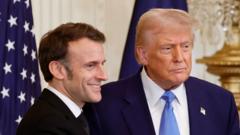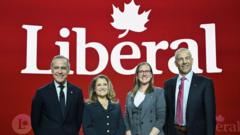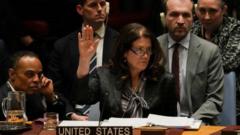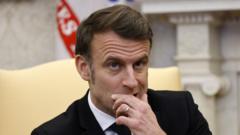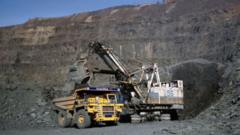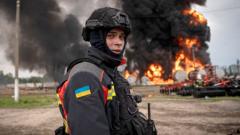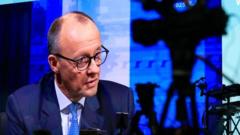On the anniversary of Russia's full-scale invasion, Ukrainian President Volodymyr Zelensky expressed optimism about concluding the war by the end of this year while highlighting the importance of security arrangements to deter future aggression from Moscow.
Zelensky Expresses Hope for Year-End Resolution to Ukraine War
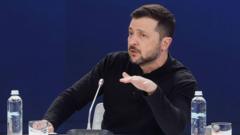
Zelensky Expresses Hope for Year-End Resolution to Ukraine War
President Zelensky emphasizes security guarantees and NATO membership as critical to ending the conflict with Russia.
The third anniversary of Russia's invasion saw President Volodymyr Zelensky articulate his aspirations for the ongoing conflict, stating, "We hope that we can finish this war this year." This optimism came as he addressed a summit in Kyiv attended by European leaders and Canadian Prime Minister Justin Trudeau. Zelensky underscored the pressing need for security guarantees to safeguard Ukraine from potential future incursions by Russia.
Central to Zelensky's remarks was the notion that membership in the European Union and NATO would provide essential support in stabilizing Ukraine's security landscape. "Joining the EU and NATO soon would help us very much," he asserted, emphasizing the urgency for these affiliations. Notably, he previously indicated a willingness to resign as president in exchange for NATO membership for Ukraine, a condition Russia has dismissed outright in any potential peace negotiations.
The summit served as a platform for Zelensky to also discuss the humanitarian dimensions of the war, suggesting that a "full" exchange of prisoners of war could mark the start of a resolution. Since the onset of hostilities, there have been numerous exchanges of captured personnel, with estimates placing the number of Ukrainian prisoners held by Russia at over 8,000. "This is the fair and just option," he remarked, referring to the plight of many detained during the ongoing conflict and since the annexation of Crimea in 2014.
While the atmosphere at the summit was one of solidarity among Ukraine’s allies, questions lingered regarding the stance of the United States. Zelensky faced inquiries about his relationship with former President Donald Trump, who has previously been critical of Ukraine's leadership and called for an expedited peace process, which could demand concessions from Kyiv. Despite this, Zelensky remained focused on rallying continued U.S. support.
Canadian Prime Minister Trudeau echoed these sentiments, suggesting a shift in global power dynamics, implying that might does not guarantee legitimacy or success. Additionally, Danish Prime Minister Mette Frederiksen expressed a willingness to consider peacekeeping roles for troops in Ukraine post-conflict, though she insisted more clarity is needed on several contentious issues.
As the leaders convened, European Commission President Ursula von der Leyen remarked on Ukraine's potential EU accession before 2030 if reforms continue at their current pace. The summit concluded with solemn reflections on the staggering human and material toll the war has exacted on Ukraine and its people, as the international community reevaluates its strategies in response to the protracted conflict.
Central to Zelensky's remarks was the notion that membership in the European Union and NATO would provide essential support in stabilizing Ukraine's security landscape. "Joining the EU and NATO soon would help us very much," he asserted, emphasizing the urgency for these affiliations. Notably, he previously indicated a willingness to resign as president in exchange for NATO membership for Ukraine, a condition Russia has dismissed outright in any potential peace negotiations.
The summit served as a platform for Zelensky to also discuss the humanitarian dimensions of the war, suggesting that a "full" exchange of prisoners of war could mark the start of a resolution. Since the onset of hostilities, there have been numerous exchanges of captured personnel, with estimates placing the number of Ukrainian prisoners held by Russia at over 8,000. "This is the fair and just option," he remarked, referring to the plight of many detained during the ongoing conflict and since the annexation of Crimea in 2014.
While the atmosphere at the summit was one of solidarity among Ukraine’s allies, questions lingered regarding the stance of the United States. Zelensky faced inquiries about his relationship with former President Donald Trump, who has previously been critical of Ukraine's leadership and called for an expedited peace process, which could demand concessions from Kyiv. Despite this, Zelensky remained focused on rallying continued U.S. support.
Canadian Prime Minister Trudeau echoed these sentiments, suggesting a shift in global power dynamics, implying that might does not guarantee legitimacy or success. Additionally, Danish Prime Minister Mette Frederiksen expressed a willingness to consider peacekeeping roles for troops in Ukraine post-conflict, though she insisted more clarity is needed on several contentious issues.
As the leaders convened, European Commission President Ursula von der Leyen remarked on Ukraine's potential EU accession before 2030 if reforms continue at their current pace. The summit concluded with solemn reflections on the staggering human and material toll the war has exacted on Ukraine and its people, as the international community reevaluates its strategies in response to the protracted conflict.

